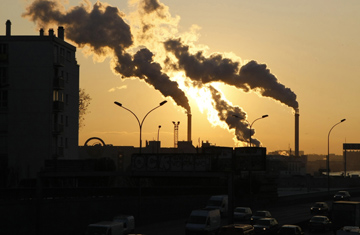
Water vapor billows from smokestacks in Paris
It was unveiled as a monumental act of the French Republic — a measure so important President Nicolas Sarkozy ranked it beside "decolonization, election of the President by universal suffrage, abolition of the death sentence and legalization of abortion" in the list of national accomplishments. Yet a mere seven months after making those lofty comparisons, Sarkozy this week decided to bury his vaunted tax on carbon emissions designed to help slow global warming. The move was the first policy fatality in the wake of the March 21 regional elections that handed leftist opponents a landslide victory.
Less than 24 hours after the disastrous regional results were announced, Sarkozy instructed Prime Minister François Fillon to cull the carbon tax rather than apply it as planned. The reason: the reform was one conservative voters and legislators alike have derided as leftist. At its heart was a $23 tax on each ton of carbon produced — mainly applied at the gas pump and via heating bills.
The measure was intended to prod consumers to conserve energy and invest in greener cars and insulation, and raise $4.7 billion to $6.1 billion in new annual revenues to finance state-funded ecological investments. But what voters and rightist parliamentarians saw in it was one of the most visible examples of Sarkozy doing the opposite of what he'd promised when running for the presidency — and in this case, creating new taxes rather than cutting and eliminating as pledged. "Up till now, Sarkozy has led by saying 'I believe and I have decided,' and he's now being forced to modify that to 'I will do what I was elected to do,'" says political analyst Jean-Luc Parodi. "He's the example that remarkable people are equally remarkable when they make mistakes, and he's having to face some of those. In reality, the disastrous regional elections gave him the excuse to backtrack on the very unpopular carbon tax."
The carbon tax had been plagued with troubles from the start — including the near refusal by rightist legislators to pass it until the Elysée whipped them into line in November 2009. A month later — just days before it was set to take effect — France's Constitutional Council struck the law down because it unlawfully applied measures to consumers while exempting French companies, by far the biggest carbon emitters. Sarkozy pledged to widen the measure to include businesses. But that only mobilized France's employers' lobby. With the voters finally having had their say, Sarkozy has decided to shelve the measure he once said would "save the human race."
The President maintains he is only delaying application of the tax until the E.U. comes up with a similar initiative applicable to all member states. "Environmental dumping threatens our jobs, [and] it would be absurd to tax French companies while giving a competitive advantage to those in polluting countries," Sarkozy argued, saying he remained committed to a carbon tax as a necessary move to protect the environment — though only once nations "who continue to pollute without shame" agree to become as virtuous.
How likely is that to happen? Not very, according to media reports in France. French newspapers and television news channels said Sarkozy's address meant the carbon tax was "dead and buried" — most of all because of the high improbability of all 27 E.U. members voting in an identical measure. Even Sarkozy's own allies are questioning the President's logic. "If we wait for Europe to make a decision, the carbon tax will be put off indefinitely," lamented Sarkozy's Secretary of State for Ecology Chantal Jouanno in the daily Libération Thursday. "I despair this stand-down, and I despair that ecolo-skepticism has won out."
But as Parodi notes, most conservatives are elated over the move — and emboldened to defy future Sarkozy measures they disagree with. "The taboo of opposing his leadership has been broken," Parodi says. Meaning, the postregional victim list of would-be Sarkozy policies is likely to grow over the coming year.
